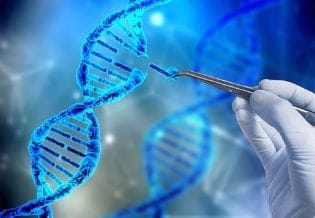Submit Your Cancer Genetics & Biomarker Research
Join leading pathophysiology researchers advancing molecular understanding of cancer through biomarker discovery, disease pathway analysis, and mechanistic studies. Your breakthrough deserves a journal that understands the complexity of cancer genetics.
Two Convenient Submission Methods
ManuscriptZone Portal
Our comprehensive manuscript management system provides real-time tracking, auto-save functionality, and direct communication with expert cancer genetics editors throughout the review process.
- Track your submission status in real-time
- Receive reviewer comments instantly
- Auto-save prevents data loss
- Guided workflow for complex submissions
- Secure document management
Fast Submission Form
Perfect for straightforward biomarker studies and molecular pathway research. Complete your submission in 15 minutes without creating an account-ideal for time-sensitive cancer genetics findings.
- No account creation required
- Simple, streamlined interface
- Complete submission in 15 minutes
- Immediate confirmation email
- Best for standard research articles
Cancer Genetics Research We Publish
Original Research Articles
Novel biomarker discovery studies, molecular pathway analyses, gene expression profiling, proteomics investigations, and mechanistic studies elucidating cancer pathogenesis at the molecular level.
Biomarker Validation Studies
Comprehensive validation of diagnostic, prognostic, or predictive biomarkers in cancer. Include sensitivity/specificity analyses, ROC curves, and clinical utility assessments for molecular markers.
Systematic Reviews & Meta-Analyses
Comprehensive syntheses of cancer genetics literature, biomarker meta-analyses following PRISMA guidelines, and critical evaluations of molecular mechanisms across multiple studies.
Methods & Protocols
Novel techniques for biomarker detection, genomic analysis protocols, bioinformatics pipelines for cancer genetics data, and validated experimental methodologies for molecular studies.
Short Communications
Preliminary findings in cancer biomarker research, novel molecular targets, unexpected pathway interactions, or time-sensitive discoveries in cancer genetics requiring rapid dissemination.
Disease Model Studies
In vitro and in vivo cancer models, patient-derived xenografts, organoid systems, and cellular models for studying cancer pathophysiology and testing molecular hypotheses.
Pre-Submission Checklist for Cancer Genetics Research
Your Manuscript Journey: Submission to Publication
Expert Review by Cancer Genetics Specialists
Your cancer biomarker research will be evaluated by leading pathophysiology experts who understand the nuances of molecular mechanisms, disease pathways, and biomarker validation. Our peer review process ensures rigorous assessment while providing constructive feedback to strengthen your manuscript.
Transparent Review Process: We maintain a single-blind peer review system where reviewers are selected based on their expertise in cancer genetics, molecular pathology, and biomarker research. Each manuscript receives evaluation from 2-3 specialists in your specific research area, ensuring relevant and insightful feedback that advances your work.
Our reviewers assess manuscripts based on scientific rigor, novelty of biomarker findings, appropriateness of molecular techniques, statistical validity, reproducibility of methods, and potential impact on understanding cancer pathophysiology. We prioritize constructive criticism that helps authors improve their research presentation while maintaining high publication standards.
Why Cancer Genetics Researchers Choose JCGB
Submission Requirements for Cancer Genetics Studies
To ensure efficient processing of your biomarker research, please prepare the following materials before beginning your submission:
Manuscript Components: Your cancer genetics manuscript should include a structured abstract (250 words maximum), 5-8 keywords relevant to molecular pathology and biomarker research, comprehensive introduction establishing the pathophysiological context, detailed methods section describing molecular techniques and statistical analyses, results with appropriate figures and tables, discussion interpreting findings within the cancer genetics literature, and conclusions highlighting translational implications.
Data Transparency: JCGB strongly encourages deposition of raw genomic data, proteomics datasets, and bioinformatics code in appropriate repositories. For biomarker studies, provide access to underlying data supporting sensitivity/specificity claims. Include repository accession numbers (GEO, SRA, ProteomeXchange) in your manuscript. If data cannot be shared due to patient privacy concerns, provide a clear data availability statement explaining access procedures.
Ethics Documentation: All cancer genetics research involving human samples must include IRB approval documentation, informed consent procedures, and compliance with HIPAA or equivalent regulations. Animal studies require IACUC approval and adherence to ARRIVE guidelines. For biomarker validation studies using clinical samples, describe patient recruitment, inclusion/exclusion criteria, and sample collection protocols in detail.
Reporting Standards: Follow discipline-specific reporting guidelines appropriate to your study design. Biomarker validation studies should follow REMARK guidelines, diagnostic accuracy studies should use STARD, systematic reviews should follow PRISMA, and animal studies should comply with ARRIVE. Include completed checklists as supplementary files to expedite peer review.
Figure Quality: Molecular biology figures including Western blots, immunohistochemistry images, flow cytometry plots, and microscopy images must be high-resolution (minimum 300 DPI) in TIFF or PNG format. Provide original, unprocessed images as supplementary files. For biomarker ROC curves and survival analyses, ensure axes are clearly labeled with appropriate statistical annotations.
Understanding Our Acceptance Rate
JCGB maintains a 59% acceptance rate, reflecting our commitment to publishing high-quality cancer genetics research while supporting authors through the peer review process. This acceptance rate indicates that we value rigorous science and provide constructive feedback to help strengthen manuscripts that show promise but require revision.
Manuscripts are typically declined when they fall outside our scope (clinical treatment outcomes rather than molecular mechanisms), lack sufficient methodological rigor for biomarker validation, present findings without adequate statistical power, or fail to advance understanding of cancer pathophysiology. Our editors provide detailed feedback even for declined manuscripts, often suggesting alternative journals or recommending additional experiments to strengthen the work.
For cancer genetics researchers, this acceptance rate means your biomarker discovery studies, pathway analyses, and mechanistic investigations have a strong chance of publication if they meet scientific standards and contribute novel insights to understanding cancer at the molecular level. We encourage submission of well-designed studies even if results are negative or unexpected-such findings are valuable for the cancer genetics community.
Article Processing Charges & Waivers
As an open access journal, JCGB charges an Article Processing Charge (APC) to cover peer review coordination, editorial production, hosting infrastructure, and indexing services. This ensures your cancer genetics research is immediately accessible worldwide without subscription barriers.
The standard APC for accepted manuscripts is clearly listed on our website. However, we recognize that funding availability varies across institutions and career stages. JCGB offers APC waivers and discounts for early-career investigators, researchers from low- and middle-income countries, and authors without institutional funding support. Waiver requests are evaluated confidentially and do not influence editorial decisions.
To request an APC waiver, indicate your eligibility during the submission process and provide brief justification. Our editorial office will respond within 48 hours. We are committed to ensuring that financial constraints do not prevent publication of important cancer biomarker research that advances understanding of disease mechanisms.
Ready to Share Your Cancer Genetics Breakthrough?
Join the community of pathophysiology researchers advancing molecular understanding of cancer. Submit your biomarker discovery, pathway analysis, or mechanistic study today and reach oncologists, molecular biologists, and translational researchers worldwide.
Need assistance with your cancer genetics & biomarkers submission? Our editorial team is here to help with scope questions, technical issues, or submission guidance. Contact us at [email protected]


